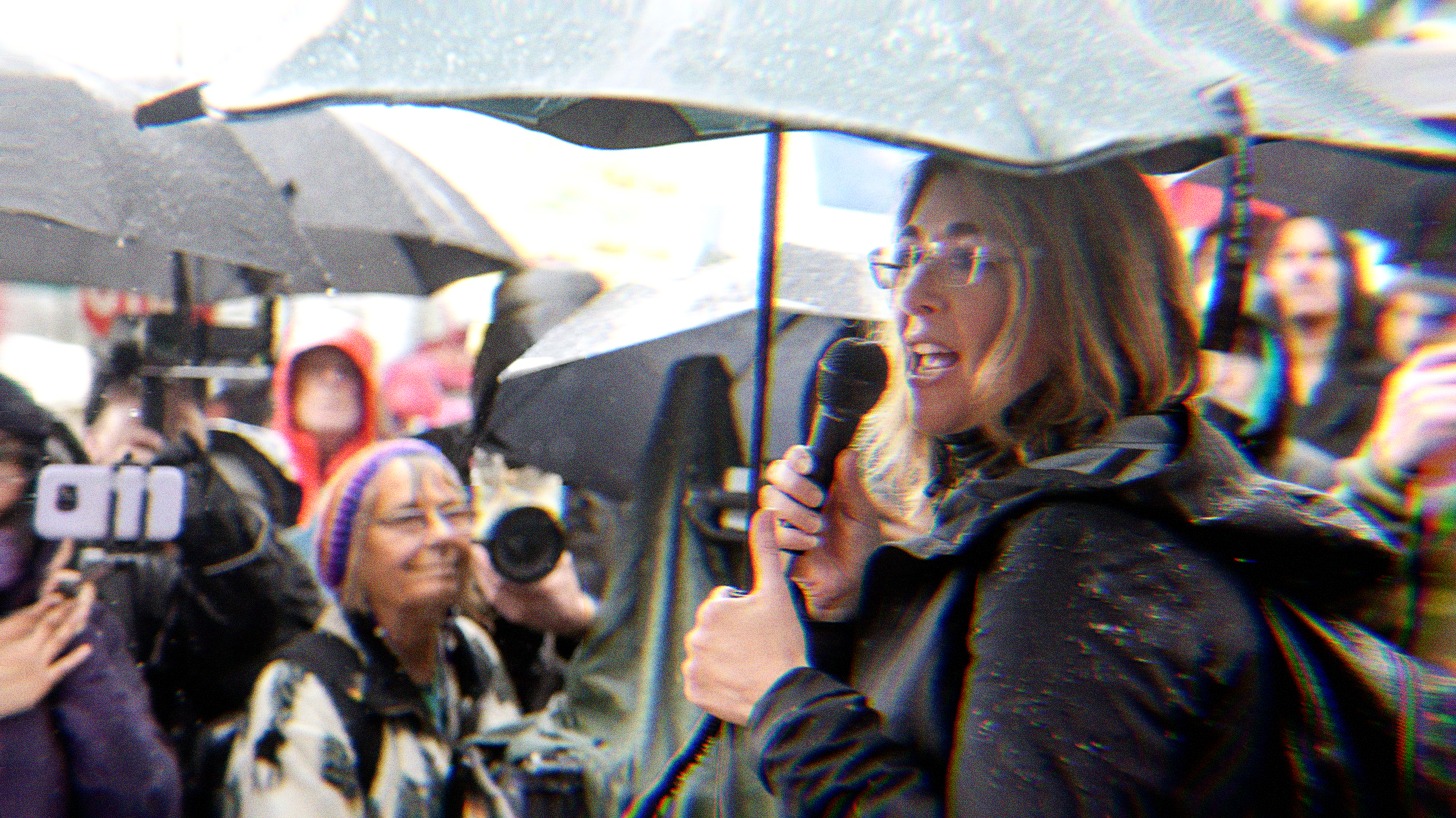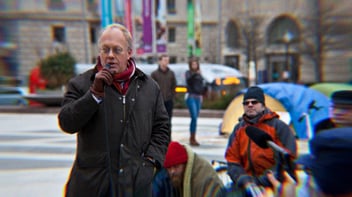Progressive Spotlight: Naomi Klein.
Resisting the Shock.
 Image Description: Naomi Klein speaking at an event in the rain.
Image Description: Naomi Klein speaking at an event in the rain.
Naomi Klein is a pivotal figure and intellectual on the political left, known for her sharp critiques of global capitalism.
Born into a politically engaged family in Canada, Klein’s upbringing imbued her with a deep sense of social justice, which has informed her perspective on global issues.
She gained notoriety through her condemnations of capitalism and colonialism, her anti-war stance, and her skillful focus on the struggles marginalized communities confront every day.
In recent years, Klein has trained her anti-capitalist message on the planet-altering impacts of seemingly limitless fossil fuel consumption, advocating passionately—and effectively—for a Green New Deal. This ambitious plan aims to prevent the worst consequences of climate change by transitioning to sustainable energy sources, promising to generate millions of jobs in the process.
Among her seminal works is The Shock Doctrine: The Rise of Disaster Capitalism. Klein offers a blistering critique of the con job that is free-market capitalism, detailing how it has fostered an exploitative industry that thrives on catastrophe, upheaval, and suffering for financial benefit.
As Klein writes, one of the architects of so-called “disaster capitalism” was none other than Milton Friedman, who she called the “grand guru of the movement for unfettered capitalism and the man credited with writing the rulebook for the contemporary, hyper-mobile global economy.”
A year before his death, Friedman, who was 93 when Hurricane Katrina battered New Orleans, wasted little time to deploy his philosophy, as Klein writes, and seize upon the unfolding disaster.
“Most New Orleans schools are in ruins, as are the homes of the children who’ve attended them. The children are now scattered all over the country,” Friedman wrote in a Wall Street Journal article shortly after the storm. “This is a tragedy. It is also an opportunity to radically reform the educational system.”
As Klein notes, Friedman suddenly took up interest in the New Orleans public school system. Instead of encouraging greater public funding, however, he endorsed “school vouchers”—a seemingly innocent and innocuous policy that attempts to accomplish something far more menacing than the phrase suggests: The defunding and destruction of public schools, and by extension, working-class unions.
“A network of right-wing think-tanks seized on Friedman’s proposal and descended on the city after the storm,” Klein writes. “The administration of George W. Bush backed up their plans with tens of millions of dollars to convert New Orleans schools into charter schools, publicly funded schools run by private entities across to their own rules.”
“In his view,” Klein writes of Friedman, “the states’ sole function were to protect our freedom both from the enemies outside our gates and from our fellow citizens, to preserve law and order, to enforce private contracts, to foster competitive markets.”
The pillaging of public infrastructure and resources has long been the goal of Friedman and his influential band of free-market vultures. Friedman even had a phrase for this, “economic shock treatment.”
Ironically, these same disaster-seekers share an obsession with militarizing borders to ostensibly protect their economic interests but have no problem systematically thriving off of manufactured chaos in countries they have no personal geographical claim.
The first time this was deployed was in Chile, following General Augusto Pinochet’s violent, U.S.-backed coup that overthrew the democratic government of Salvador Allende on Sept. 11, 1973.
As Klein writes: “Friedman advised Pinochet to impose a rapid-fire transformation of the economy: tax-cuts, free trade, privatized services, cuts to social spending and deregulation. Eventually Chileans even saw their public schools replaced with voucher-funded private ones. It was the most extreme capitalist makeover ever attempted anywhere, and it became known as the ‘Chicago School Revolution’ since so many of Pinochet’s economists had studied under Friedman at the University of Chicago.”
The plan to reshape Chile’s economy was presented to Pinochet’s unelected regime a day after Allende died and his government was overthrown.
In recent history, one of the most glaring example of so-called “economic shock therapy,” outside of New Orleans, occurred in Iraq after the deadly U.S. invasion in 2003. Spearheaded by Donald Rumsfeld, a Friedman discipel, the then-U.S. Defense Secretary “took this one step further, because Rumsfeld believed that, actually, the work of policing and of war fighting could also be privatized and outsourced,” Klein said in a 2007 interview with Democracy Now!.
“My motivation for writing the book was—there has been no accountability for these crimes,” Klein told Amy Goodman. “And in Latin America, there have been truth commissions, there have been trials. The people who were at the heart of this very violent transformation, many of them have actually been held accountable. Not all of them, but many of them have actually been held accountable, if not in the courts, then certainly in a deep and important public discussion of truth and reconciliation. But this country, that has never happened, despite the fact that there has been a great deal of wonderful investigative reporting. And because there has never been any accountability, the same players are really at it again.”
Image Source
- Protect the Inlet, PDM-owner, via Wikimedia Commons. Changes were made.
Rashed Mian is the managing editor of the award-winning News Beat podcast and co-founder of the newly launched Free The Press (FTP) Substack newsletter. Throughout his career, he has reported on a wide range of issues, with a particular focus on civil liberties, systemic injustice and U.S. hegemony. You can find Rashed on X @rashedmian and on Bluesky @rashedmian.bsky.social.


